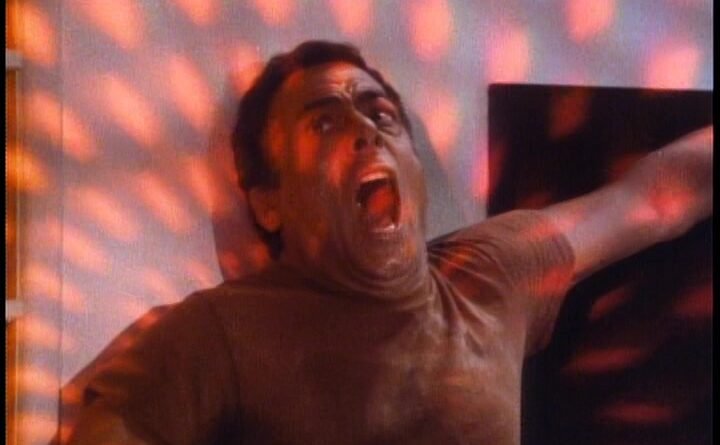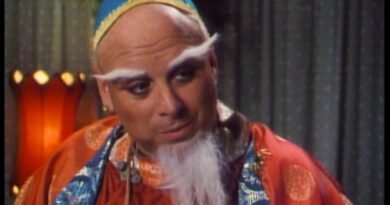Tales from the Darkside: “Bigalow’s Last Smoke” (S1E21)

Bigalow’s Last Smoke is a surreal psychological horror episode that takes a satirical, darkly exaggerated swing at addiction, specifically, smoking. Part Kafkaesque nightmare, part PSA fever dream, this one trades in traditional horror tropes for claustrophobic tension and absurdist dread. It may not land perfectly for every viewer, but it’s certainly one of the more ambitious and unique episodes of the season.
Plot Summary
Frank Bigalow is an average man with a nasty cigarette addiction. He wakes up one day to find himself trapped in a strange, windowless room that resembles a hotel suite or maybe a padded cell. A calm but deeply unsettling man named Dr. Synapsis appears via intercom and claims to be helping Bigalow quit smoking once and for all.
But this isn’t your average intervention.
There’s no escape, and no cigarettes. Bigalow is constantly monitored, punished with electric shocks for thinking about smoking, and subjected to bizarre psychological games. There are fake windows, fake food, and even fake fire. All the while, Dr. Synapsis and his staff, who are never fully seen, toy with Bigalow, claiming it’s for his own good. Over time, Bigalow loses his grip on reality.
The episode ends on a bleak, ambiguous note, with Bigalow seemingly broken. Whether he’s cured, brainwashed, or simply destroyed is left to the viewer’s interpretation.
What Works
A Bold Concept
This is one of the most original premises in Tales from the Darkside‘s first season. It plays out more like an absurdist short play than a typical horror story, and that theatrical approach sets it apart.
Claustrophobic Atmosphere
The set design is brilliant in its simplicity. The intentionally sterile, windowless room helps reinforce Bigalow’s imprisonment and growing madness. There’s a real sense of being trapped.
Strong Lead Performance
Cigarette addiction isn’t an easy subject to dramatise without leaning on clichés, but the actor playing Bigalow (Ronny Cox) does a great job. He moves believably from confusion to desperation to breakdown, anchoring the episode emotionally.
Dark Satire
There’s something perversely funny about how extreme the anti-smoking program becomes. It’s a reflection of real-world methods of the 1980s, exaggerated to monstrous proportions.
What Doesn’t Work
Repetitive Pacing
Much of the episode is Bigalow trying and failing to escape or reason with his captors, which, while effective at building tension, can feel a bit drawn out. The middle drags without much escalation.
Lack of Resolution
Depending on your taste, the ambiguous ending may frustrate more than intrigue. We never learn who Dr. Synapsis really is, what the true purpose of the program is, or if Bigalow ever gets out. Some viewers will love the open-endedness; others may find it unsatisfying.
Low Horror Quotient
This is definitely horror-adjacent rather than horror-forward. It’s more about psychological discomfort than scares, so traditional horror fans may find it a bit tame.
Themes: Addiction, Control, and Dehumanisation
At its core, Bigalow’s Last Smoke is about losing agency. Bigalow, once in control of his addiction, is suddenly in a world where every part of his life is managed, monitored, and manipulated. The message is clear: addiction is a trap, but so is forced recovery when it strips a person of dignity.
There’s also an underlying critique of authoritarian methods used to enforce change. Dr. Synapsis represents a cold, bureaucratic system more interested in breaking someone than healing them. It raises an important question: can true change ever come through coercion?
Final Thoughts: A Moody, Mind-Bending Morality Tale
Bigalow’s Last Smoke may not be everyone’s cup of tea, but it’s undeniably a standout in terms of tone and style. It feels like 1984 meets The Twilight Zone with a cigarette-fueled twist. For viewers who enjoy cerebral horror or psychological thrillers, it’s a rewarding, if somewhat maddening, experience.
It doesn’t try to shock or scare in a traditional sense. Instead, it makes you squirm with its depiction of isolation, control, and mental collapse. It’s a horror story for the mind more than the nerves.
Who Would Enjoy This Episode?
- Fans of psychological and Kafkaesque horror
- Viewers who appreciate satire with a sinister edge
- Anyone interested in addiction narratives told creatively
Who Might Not Enjoy It?
- Fans expecting classic monsters or gore
- Those who dislike open-ended, ambiguous storytelling
- Viewers who prefer faster-paced horror plots
Final Verdict: A Smoky Descent into Madness
Bigalow’s Last Smoke is a slow burn (yes, pun intended) that offers an intelligent, eerie take on a familiar topic. It’s not a jump-scare kind of horror, but its unsettling tone and grim message linger long after the credits roll. Light up at your own risk.




